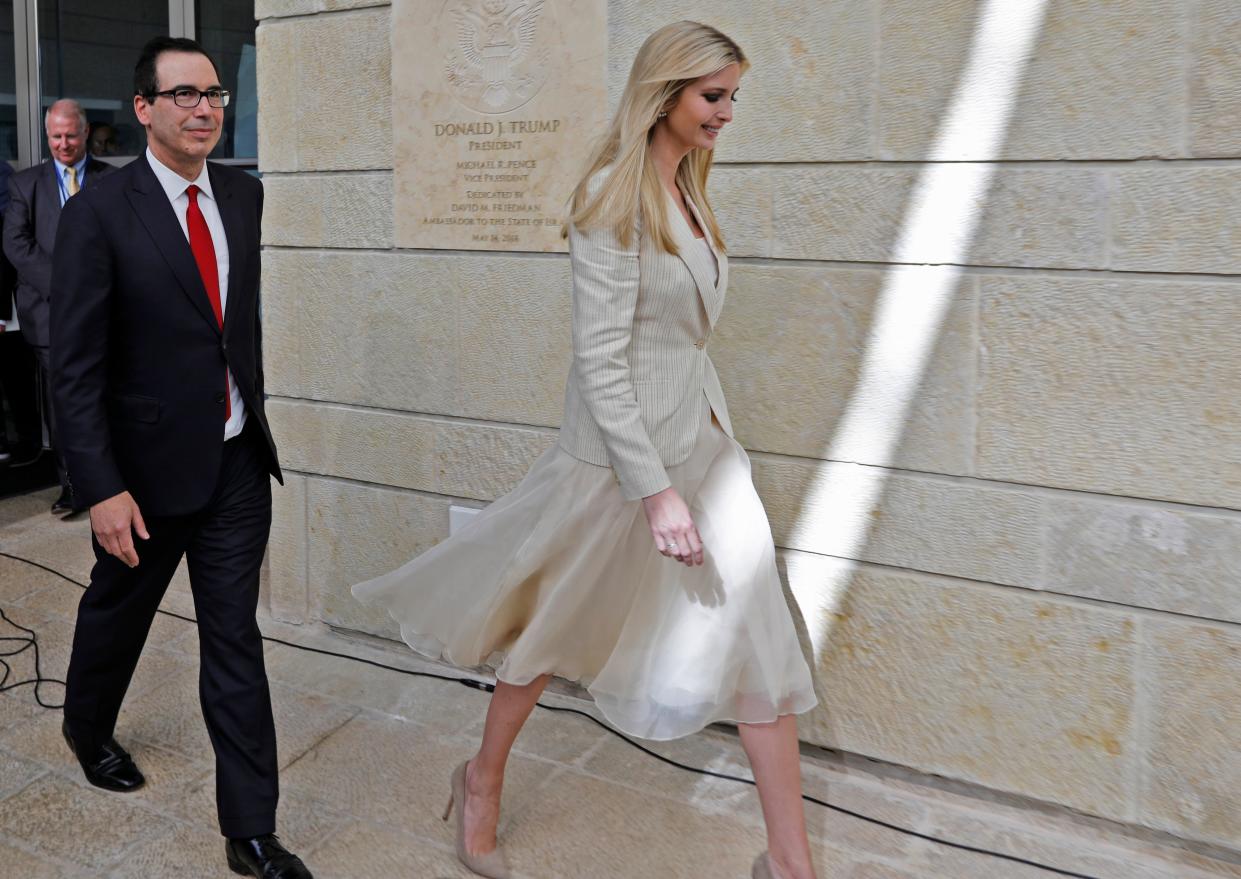Ivanka Trump was blessed by a rabbi who said women who dress immodestly are like animals

Ivanka Trump was blessed by a controversial rabbi, Yitzhak Yosef, who once implied that women who dress immodestly are “animals,” that black people are “monkeys,” and that non-Jewish people should not live in Israel unless they respect its religious laws.
The first daughter and her husband, Jared Kushner, are in Israel to mark the opening of the U.S. embassy in Jerusalem, a city considered holy by three religions, amid protests between Palestinian protesters and the Israeli military, that have resulted in the deaths of more than 50 people, including eight children, according to ABC News.
A post shared by Ivanka Trump (@ivankatrump) on May 14, 2018 at 9:37am PDT
“Today we dedicated the new US Embassy in Jerusalem — a longtime promise to the American and Israeli people,” Ivanka captioned an Instagram photo depicting her wearing a $1,890 Ralph Lauren jacket with a matching skirt and taupe pumps. “When President Trump makes a promise, he keeps it.’”
On Sunday, the couple received the blessing from Yosef, an event that disgusted many on social media.
Racists https://t.co/dkPEAnVEQL
— Amy (@flwrpwr1969) May 14, 2018
Ivanka Trump and Jared Kushner choose a Rabbi to be blessed by: Yitzhak Yosef, who compares black people to monkeys, women who dress “immodestly” to animals, wants to expel non-Jews out of Israel to Saudi Arabiahttps://t.co/RfvCWVpqdb
— Alfons López Tena #FBPE (@alfonslopeztena) May 14, 2018
Not surprised that Ivanka Trump and Jared Kushner are being blessed by Sephardic Chief Rabbi Yitzhak Yosef, the Rabbi who infamously compared Black people to monkeys.
The head of their household considers African countries "shitholes" and insults minorities regularly. Go figure.
— Ernest Owens (@MrErnestOwens) May 14, 2018
Of course, openly using racial slurs has never been a problem for this garbage family and Regime, so Jared and Ivanka met with Rabbi Yitzhak Yosef for a blessing, less than 2 months after his slurs towards Black Peoplehttps://t.co/lwhphaSzHs
— Sasha Fox (@third_sasha) May 14, 2018

According to a 2017 Times of Israel story, the rabbi once suggested during a weekly sermon that women who did not dress modestly are comparable to animals.
“If the secular knew how much we respect the woman… Everything we do is for a woman’s dignity,” Yosef said, according to the website, which credited the remarks to the Hebrew-language website Kikar Hashabat. “A woman is not an animal; she has to keep her dignity. To be modest [in her dress] is her dignity.”
During that sermon, the rabbi also referred to the religious tradition of not allowing men to hear a woman sing by herself, explaining that when he finds himself in such situations, he should pretend to read a book. “That way they could all see that I am not listening, my head is in the book, close to what matters,” he reportedly said.
Racially charged comment made by Israeli Chief Rabbi Yitzhak Yosef, comparing people of color to "monkeys", is utterly unacceptable. https://t.co/uQRPk7meyl
— ADL (@ADL_National) March 20, 2018
In March, the Times of Israel also reported that Yosef used the word “kushi,” which is considered racist. “You can’t make the blessing on every ‘kushi’ you see — in America, you see one every five minutes, so you make it only on a person with a white father and mother,” he reportedly said. “How would you know? Let’s say you know! So they had a monkey as a son, a son like this, so you say the blessing on him.”
At the time, Yosef explained that he was referencing the Talmud, the book of Jewish law, which states that the blessing is given when a person sees an elephant or a monkey. However, the Anti-Defamation League called the rabbi’s comments “utterly unacceptable.”
And in 2016, the Times of Israel reported that Rabbi Yosef remarked that non-Jewish people should not live in Israel if they don’t obey the laws of Judaism. “According to Jewish law, gentiles should not live in the Land of Israel,” Yosef reportedly said. “If a gentile does not agree to take on the seven Noahide Laws, we should send him to Saudi Arabia. When the true and complete redemption arrives, that is what we will do.”
The rabbi also dislikes smartphones and even destroyed one belonging to a student by throwing it in water. “If there is a student with an iPhone, then he needs to be kicked out of the yeshiva, without a doubt, for sure,” he reportedly said in 2015, according to the Times of Israel, which attributed the story to Kikar Hashabat.
At the time, Yosef recalled an example of a student whose phone rang during class. After telling the student to bring him a bowl of water, the rabbi said, “I put [the phone] inside, it bubbled, and was gone. The phone was gone.”
According to Yosef, the boy said, “Rabbi, that cost me hundreds of shekels,” to which he responded: “I told you not to bring it; there was an announcement not to do so. I don’t have to pay you.”
Read more from Yahoo Lifestyle:
Ivanka Trump opens U.S. embassy in Jerusalem in $2,000 blazer
Ivanka Trump Posts Frosty Instagram Honoring Mom Ivana as ‘the Best Skier I Know’
Follow us on Instagram, Facebook, and Twitter for nonstop inspiration delivered fresh to your feed, every day.

